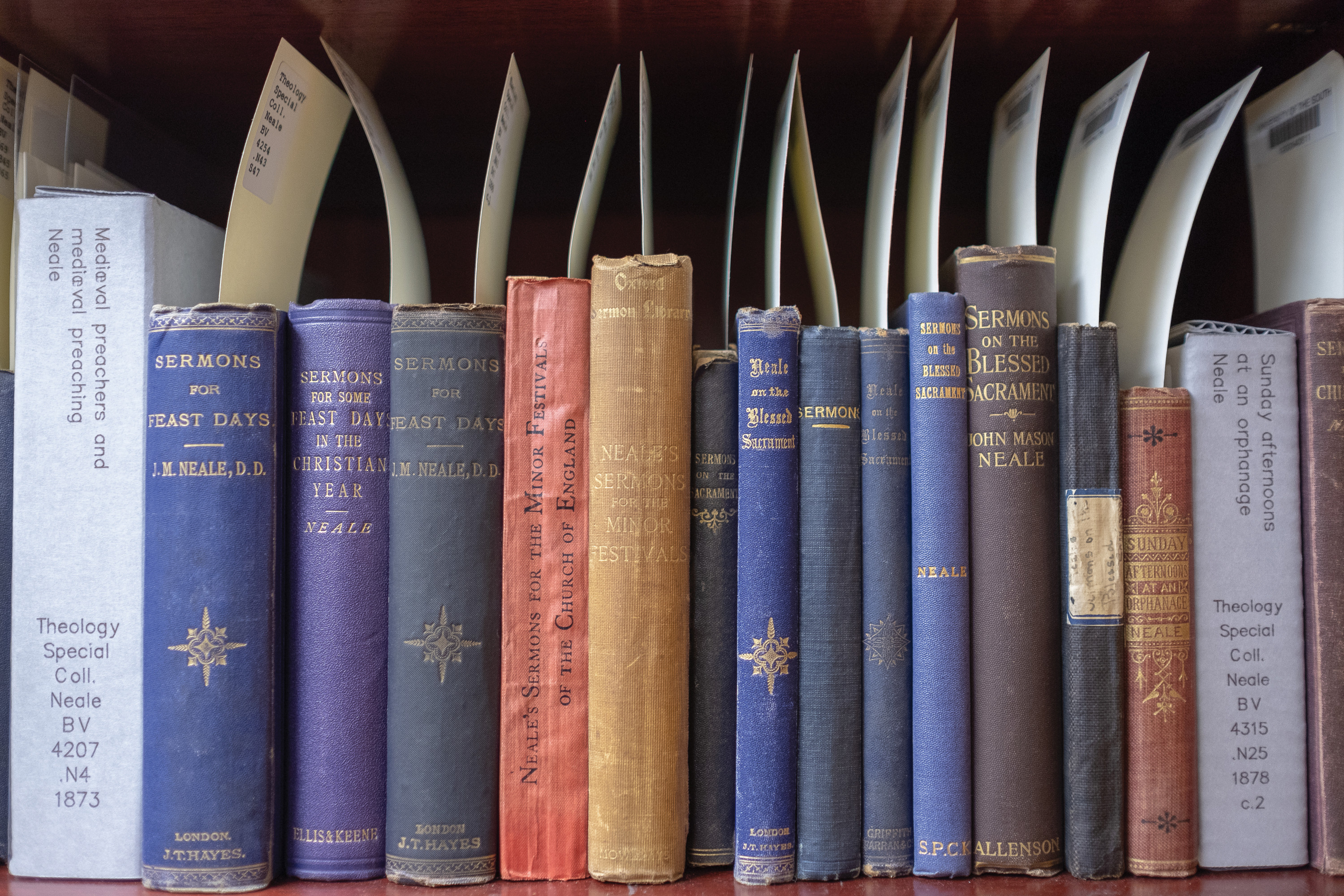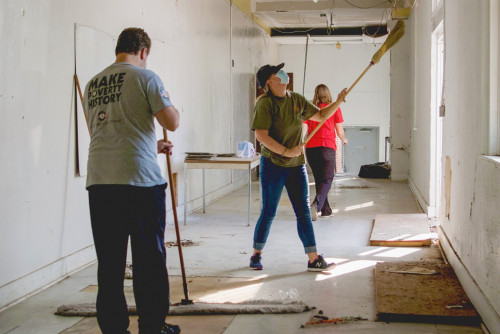Anglican Studies
Anglican studies offerings provide the opportunity to explore the tradition, heritage, and current experience of Christianity expressed in the Anglican and Episcopal churches.
Read. Think. Write.
The School of Theology is first and foremost a residential graduate school with a rigorous academic focus. Lectures and seminars are important, but it’s the way that one engages with one’s coursework that really counts. We expect seminarians to read, to think, and to write while here.

Some of our classes are lecture style, and so there'll be 30 people in a room with a professor. But that being said, you can expect them to be fairly intimate and interactive. The faculty will invite questions and encourage you to respond to what you're hearing in the lecture. Then there are the seminar courses: in some ways, these are the most fun because there will be a handful of students gathered around a table with a professor. Having read several documents that are primary sources, or maybe having read an important book in a discipline, the group will wrestle with that text, debating with each other to emerge with a greater understanding than if they were reading by themselves.
It is our hope that people read, think, and write while at the School of Theology. But we hope that they read, think, and write with each other while they're here, and it's that collective work that is really important to what we do.
The School of Theology brings together bright minds and a wide range of views from across the Episcopal Church, and the wider Anglican Communion, for deep theological conversation and reflection. Moving through the curriculum— Bible, history, theology, spirituality, ethics, liturgics, and homiletics—with the same cohort, or class, of students, creates an environment where deep listening, vulnerable sharing, careful discourse, and personal and spiritual growth can all flourish.
Along with the Seminary, The University of the South includes the College of Arts and Sciences which has an enrollment of more than 1,700 undergraduate students. Opportunities to participate with the College are plentiful and a unique advantage for an Episcopal Seminary. Seminary students lead Bible study groups for college students, play intramural sports, participate in the Sewanee Symphony Orchestra, serve in the University's All Saints' Chapel, and engage in Catechumenate classes year-round. Some students serve as resident chaplains, living in the residence halls and providing pastoral care to the undergraduate community. Even select courses in the College are on offer to seminary students!
The master of divinity program is designed to educate a critically informed clergy for ministry in a changing world while grounded in the Anglican tradition. The School of Theology is committed to the task of integrating the various areas of theological study within a basic core curriculum.
Electives allow students to focus their attention and advance their learning in selected areas of academic and practical interest. Lectures, seminars, and small group discussions all contribute to the ongoing task of critical and practical integration of the traditions of theological learning with life in the contemporary world.
This outline represents the minimum program requirement. Many of our students take additional electives and coursework beyond the minimum requirements.
Advent Semester |
Easter Semester |
| Old Testament I: From Prehistory to the Promised Land | Old Testament II: Prophets, Exile, and Aftermath |
| New Testament I: The Gospels in Context | New Testament II: The Gospel after Jesus |
| Church Histories I: Asia & Africa | Church Histories II: Europe & North America |
| Foundations of Christian Spirituality | Introduction to Preaching |
Advent Semester |
Easter Semester |
| Systematic Theology I | Systematic Theology II |
| Pastoral Theology: Theory & Practice of Pastoral Care | Introduction to Moral Theology |
| Congregational Studies | History of Christian Worship |
| Church Music | Parish Leadership |
Advent Semester |
Easter Semester |
| Pastoral Liturgics | World Christianities & Missiology |
| Christian Education | Electives |
| Community & Organizational Leadership | |
| World Religions | |
| Elective |
Anglican studies offerings provide the opportunity to explore the tradition, heritage, and current experience of Christianity expressed in the Anglican and Episcopal churches.
There are two questions that we must address to the Holy Scriptures: “What do they mean now?” and “What did they mean then?” No serious study of the Bible can avoid either. Not to ask “What do they mean now?” is to refuse to deal with the fundamental intention of the texts, which were certainly written to inform, inspire, challenge, and convict. Not to ask “What did they mean then?” is to run the risk that the answer to the former question will be fantasy. The Scripture courses at the School of Theology are a serious attempt to address both questions, in a setting where commitment to Christ and commitment to academic integrity are seen as ultimately inseparable.
The Church is a community of moral discourse, decision, and action. Accordingly, courses in Christian ethics and moral theology are central to a seminary curriculum. The coordinating themes for the courses in Christian ethics and moral theology at the School of Theology are our obligations of love of God and neighbor as they pertain to the formation of individual and social character. Throughout, we explore the distinctiveness of the Episcopal and Anglican traditions in ecumenical conversation with other traditions of Christian faith. In all courses, we engage the Church’s contemporary challenges and on-going debates. Our hope is that our vision of God and neighbor will deepen and inspire our moral reflection and action.
History is thinking about and studying the meaning of the past, not simply to examine it but to recover a usable past that can help shape the future. The courses offered trace church history and historical theology from the formation of the church to the present. Special emphasis is given to English church history and The Episcopal Church in the United States.
The Apostle Paul explained the challenge with uncharacteristic clarity and brevity—“How are they to believe in one of whom they have never heard? And how are they to hear without someone to proclaim?” (Romans 10:14). Homiletics trains believers to be proclaimers. Building on the foundation of theology, ethics, Church history, and Biblical studies, students learn how to have something to say that is worth hearing, and how to say it well enough to be truly heard. Two courses in homiletics are required in the Master of Divinity curriculum, one in the Middler and one in the senior year. Each course is a mix of lecture and preaching groups, during which students offer sermons of their own for feedback and critique.
Liturgy lies at the core of the church’s being: in its classical definition, the ekklesia or “church” is the worshiping assembly. The study of liturgy is therefore of crucial importance in theological study. Core courses in liturgics and church music offer a basic education in historical, theoretical, and practical aspects of liturgical studies. Electives enrich this core, allowing students to pursue greater knowledge of various aspects of the liturgy.
Missiology is the study of all aspects of the mission of the Church, including theology and history of missions, current mission practice and experience, multicultural studies including that of other world religions, and social and economic issues that affect mission.
Theology is sustained through critical reflection on the sources, norms, and contents of Christian belief. This task belongs to both the individual and the community and seeks a faithful and effective expression of the Gospel for our time and place. Core courses and electives develop a student’s skill in theological reflection as integral to the church’s ministry and mission.
Theory and Practice of Ministry courses encourage students to form an understanding of human nature and a theology of lay and ordained ministry.
While research and writing are skills conventionally mastered in the humanities at the undergraduate level, many students arrive in seminary after a long hiatus between their undergraduate work and their master’s program. Other students will not have majored in the humanities and do not have the same skills as their peers. Even those who have an extensive humanities background can benefit from further work on their writing skills and from the chance to learn the particular bibliographical resources available for the academic study of theology. The course is designed to strengthen the student’s abilities in academic research and writing in the theological disciplines. It complements the introduction to theological writing that takes place during orientation.
When a student, in consultation with his/her advisor, determines that an educational goal cannot be met through courses offered, the student may propose to meet this goal through a directed reading.

Contextual Education is the broad term used at the School of Theology for the numerous ways students apply academic knowledge and classroom experience to ministry opportunities in a variety of settings.

It is important that our students develop a rich and reliable prayer life. This means providing the opportunity to pray in community day in and day out, year after year.

Living in a residential setting has a profound impact on formation. Not only does it take you out of your comfort zone, but it places you in a community with which you engage every day.

Ministry doesn’t stop once you enter seminary. Opportunities for formal and informal ministry are varied, instructive, relevant to your future, and impactful to the diverse community around us.